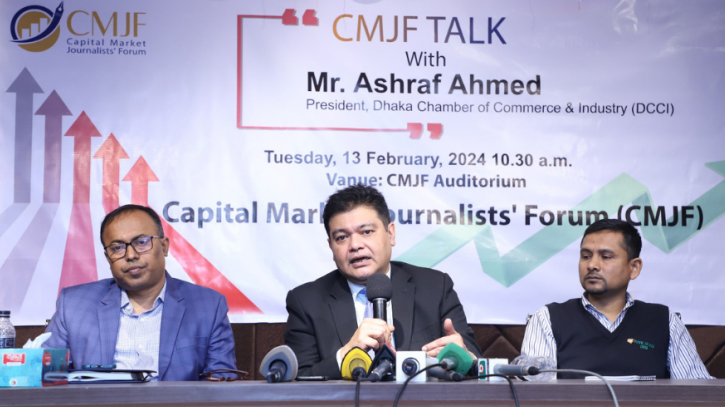
Photo: Collected
Maintaining private sector credit growth will be the biggest challenge this year. The demand for working capital has increased by 30-40 percent as the Taka depreciated against the dollar. However, the Bangladesh Bank (BB) has set a target of only 10 percent credit growth.
In this situation, meeting the current capital needs will be a significant challenge. If this issue cannot be resolved, costs must be reduced. This situation affects production, which in turn impacts growth and leads to a reduction in employment.
The Dhaka Chamber of Commerce and Industry (DCCI) is working with the government to increase credit flow, which is essential to keep the economy dynamic. DCCI President Ashraf Ahmed made these remarks while participating in the ‘CMJF Talk', organised by the Capital Market Journalists Forum (CMJF), on Tuesday.
The programme took place at the auditorium of CMJF, Al-Razi Complex, Purana Paltan in the capital. President Golam Samdani Bhuiyan delivered the welcome address at the event, which was moderated by CMJF General Secretary Abu Ali.
The DCCI president said, “Bangladesh will be a trillion-dollar economy country by 2030. To achieve this goal, the size of the economy should be increased two and a half times. A lot needs to be done to overcome this challenge. Our economy and the world economy have faced many challenges in the last one and a half to two years, mainly the problem of inflation. It was supposed to be achieved in ten years, but due to the Covid-19 pandemic, it has been delayed by 4 years. The work of 10 years now has to be done in 6 years.”
He also mentioned that there is a dollar crisis in the country now, as banks do not have enough dollar liquidity. This shortage is exacerbating the import problem, which is having a major impact on production.
In response to a question about why capital is not being collected from the market while the growth of private loans is low, the DCCI president said, “It is very difficult to obtain a long-term loan from the bank. It is not available in the capital market. You can raise money for 5 years and 10 years by issuing bonds, which can be sold whenever you want. Raising capital from the market is a bit time-consuming and will not work immediately, but it can be effective in the long run. An audit report is mandatory.”
Regarding various initiatives in this regard, he said, “Bringing good issuers to the capital market is crucial. We are taking several steps in this regard. Good issuers can come in both bonds and fixed deposits. In the bond market, primary trading is common, but secondary trading is not. We need to increase our investment by bringing in more issuers.”
In response to another question, the DCCI president said that money laundering outside the country is not solely for economic reasons. He emphasised that the primary motivation for money laundering is to seek higher returns, but investing in the country can yield higher returns than investing abroad. Therefore, money laundering is not solely for economic reasons; there may be other motivations.
Ashraf Ahmed also emphasised that businessmen involved in money laundering or any other irregularities are solely responsible, and the responsibility of one trader does not fall on all traders.
Ashraf Ahmed said, “We can work with the government on various policies,” mentioning that many new industries are emerging, and increasing the capacity of the Smart Bangladesh Vision can help the country become a trillion-dollar economy. He also stressed the importance of retaining intellectual property rights for the development of knowledge-based properties.
Regarding the various obstacles to the country's development and their elimination, he highlighted the critical issue of traffic congestion in old Dhaka. “I spoke to traders at the event yesterday. Their wholesale business is suffering due to traffic congestion, as a significant amount of time is spent traveling there. Therefore, de-congestion is crucial for traders,” he said.
He added, “Obtaining a trade license currently requires visiting 4-5 different people, which could be streamlined through a one-stop service. Increasing awareness among local traders is essential for this, although the government will not directly implement it.”
Messenger/Disha








